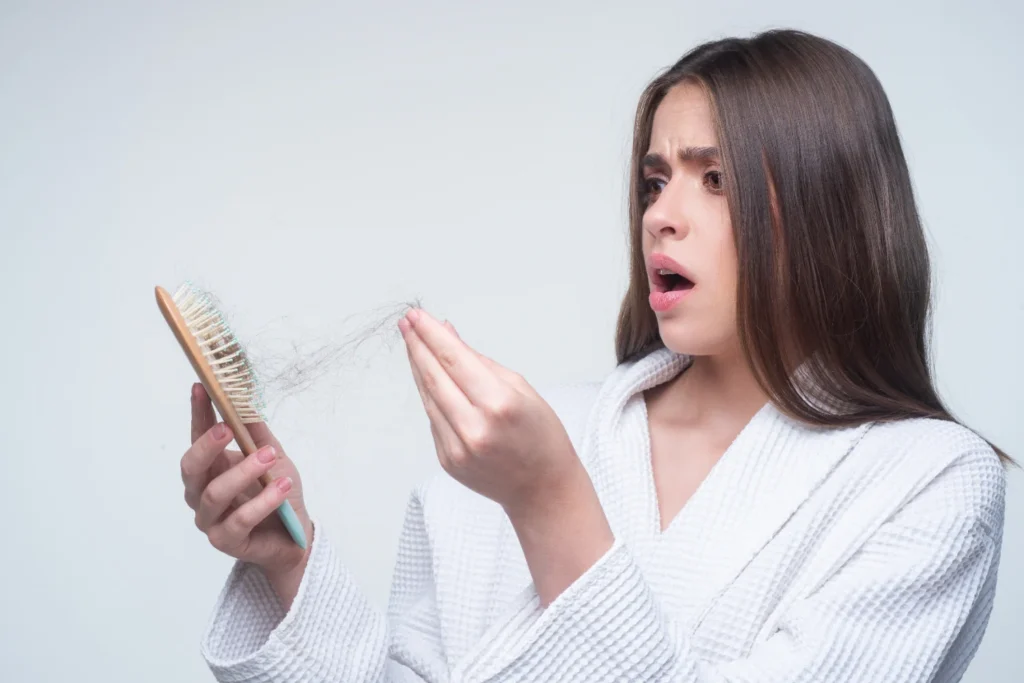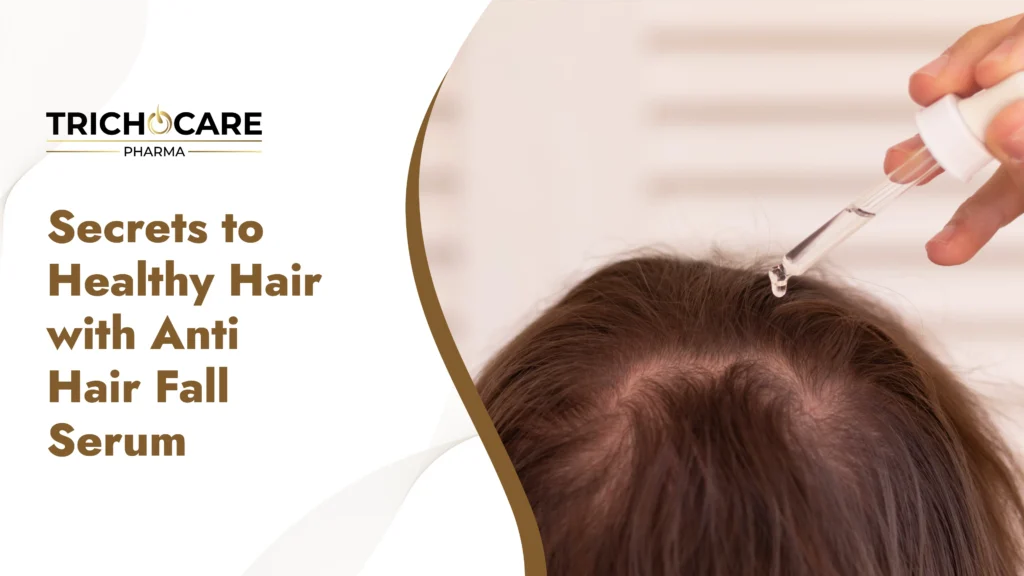Medicine for hair fall: Hair loss is a widespread issue that affects many individuals and can have a significant impact on self-esteem. Understanding the root causes of hair loss, including potential underlying endocrine conditions, is crucial for effectively addressing the problem. While male and female pattern baldness are common reasons for hair loss, it is important to consider joining a support group as there may be other factors at play such as medical conditions, nutritional deficiencies, or hormonal imbalances.
In addition to identifying the cause of hair loss, there are various treatment options available. Over-the-counter hair loss solutions and scalp massages using essential oils are popular choices. Medicine for hair fall designed to combat hair loss and stimulate hair growth can also be effective, particularly in cases of conditions like alopecia areata. Research into both over-the-counter remedies and prescription medications has shown promising results in treating different types of hair loss.
It’s worth noting that seeking professional guidance from a dermatologist or healthcare provider is recommended before starting any treatment regimen for hair loss. They can provide personalized recommendations based on your specific condition and help you navigate the available options for addressing hair loss effectively. Remember, each individual may respond differently to treatments, so patience and consistency are key when exploring solutions for hair loss.
Understanding Hair Fall: The Problem Unveiled

Hair loss, commonly known as alopecia, is another common issue involving loss of hair and bald areas of hair. This occurs when the hair follicles, tiny pockets in which hair grows, shrink or stop functioning. It may cause a slowly receding hairline or even considerable hair loss on the scalp and body.
Many things can cause rapid hair loss, such as thyroid disease and telogen effluvium. Some common causes include genetics, hormonal changes, certain medical conditions, and drugs. It is necessary to figure out the major cause of hair loss. It will help in finding out the best way to treat the problem.
The Common Reasons of Hair Fall in India
There are key reasons of hair loss in India.
First, hormonal changes may influence hair growth significantly. This can be attributed to pregnancy, menopause, or thyroid conditions in women. Such hormonal imbalances may interrupt the cycle of hair growth and result in shedding.
Second, hair loss can also be due to insufficient nutrients. If the body lacks iron, protein, and necessary vitamins, hair may become weak. In this case, the follicles may be damaged, which can cause hair to fall off easily.
Lastly, tight hairstyles, such as braids or ponytails, can cause a condition called traction alopecia. It is caused by constant pulling on the hair shaft.
Busting Myths: What Hair Fall Is Not
There are so many myths surrounding hair loss. The myths can be the reason for unnecessary worry and the implementation of remedies that don’t work.
A common fallacy is that washing your hair too often is what makes it fall off. You might see a few strands of hair fall in the shower drain; this is normal. That is known as shedding and is nothing to worry about. On the contrary, by washing your hair, your scalp stays clean and healthy-which is good for the growth of hair.
Another myth is that hair loss only occurs at the top of the head. Although male pattern baldness often manifests as a receding hairline or a bald spot on the crown, hair loss can occur anywhere on your scalp, even at the back of the head.
Know the truth and consult a healthcare professional for proper information about hair loss.
Holistic Solutions for Hair Fall

To effectively treat hair loss, you require a multi-faceted approach. This would involve medicine for hair fall, but also changes in your lifestyle and good hair care practices.
Medicine for hair fall can help with specific problems, such as hormonal imbalances or other medical conditions. Simultaneously, a healthy diet, stress management, and gentle treatment of hair can enhance hair regrowth and improve overall hair health.
Overview of Effective Medicines Available in India
India has many good Medicines for hair fall that can help with hair loss. You can find some of them over the counter in stores, while others need to be approved by a doctor.
One of the most popular medicine for hair fall is minoxidil. It is an over-the-counter medication that encourages hair growth. It is available in different forms, including solutions, foams, and shampoos.
If a person has hormonal imbalances or conditions such as androgenetic alopecia, doctors can prescribe drugs. For men, there is finasteride, and for women, there is spironolactone. These medicine help to regulate the hormones that affect hair follicles.
The right medicine for hair fall will depend on the cause and the degree of hair loss. So, it is essential to consult a healthcare professional to find the best treatment for you.
How These medicine Fight Hair Loss
Understanding how hair loss drugs, including prp therapy options, work is important. It helps you set realistic expectations and make better choices.
Medications such as minoxidil help by extending the anagen phase. This is the period when the hair follicle is actively growing. With this extra time, new hair growth can grow thicker and denser.
For their part, finasteride and spironolactone deal with hormonal causes of hair loss. These drugs are designed to inhibit specific hormones causing miniaturization of hair follicles, which helps them to suppress additional hair loss and even encourage growth of new hair.
Which is the most effective medicine for hair fall?

The most effective medicine for hair fall include minoxidil, finasteride, and hair growth supplements containing biotin, vitamins, and minerals. Consult a healthcare provider for personalized recommendations based on the underlying cause of hair fall for best results.
There are many different medicines within the field of hair fall treatment. Each one works with a specific cause and type of hair loss.
For patients suffering from androgenetic alopecia, referred to as male or female pattern baldness, their physicians often prescribe medications in the form of minoxidil and finasteride. These drugs specifically target the hormonal basis underlying this type of hair loss. If hair loss arises from medical conditions, it must be treated with the right medicine or other therapies on the underlying condition.
Supplements and vitamins for hair growth
Apart from medications, some supplements and vitamins help in the growth of hair. These give essential nutrients to maintain healthy hair follicles.
You might want to include these supplements and vitamins in your daily routine:
- Biotin : It is referred to as the “hair growth vitamin.” Biotin facilitates the formation of keratin-an important protein found in hair.
- Iron: Many people, mostly women, lose hair since they do not have adequate iron. Taking iron supplements can improve the levels. This helps strengthen hair follicles and reduces hair loss.
- Vitamin D: Having enough vitamin D ensures healthy hair follicles. Taking supplements can help in case you have low vitamin D, which may lead to better hair growth.
Massaging the scalp also promotes blood flow to the scalp. This brings important nutrients and helps boost hair growth.
Potential side effects and precautions when using hair fall medicines
Some medicines for hair fall may produce side effects even when they are useful. Awareness of the effects is imperative and its use must come with guidance from a health practitioner.
Examples also include Minoxidil, which has some secondary effects such as causing dryness, itchiness or scalp irritation. This normally triggers slight hair loss which resolves and subsides in some period upon continued use.
Some medicines, such as finasteride, can have an effect on your blood pressure. That is why you should monitor your blood pressure regularly. If you experience any unusual symptoms while taking hair fall medicines, stop using them and consult your doctor immediately.
Also, remember that what works for one is not going to work for the other. A customized plan plays a very important role for safe and effective hair loss treatment.
Tips for choosing the right hair fall medicine

When it comes to treating hair loss, the sheer number of treatment options available can seem overwhelming. However, there are a few straightforward tips that can guide you toward the most suitable solution for your specific needs.
The first step is to seek out a reputable healthcare provider or dermatologist who specializes in hair loss. By assessing the root cause and type of your significant hair loss, considering your complete medical history, current medications, and existing health conditions, they can recommend a treatment plan that is tailored to your circumstances. It’s important to communicate openly with your healthcare provider about your expectations and any concerns regarding possible side effects to work collaboratively in your treatment.
In addition, exploring lifestyle adjustments that promote healthy hair growth can complement any chosen treatment method. Adjustments such as a healthy diet rich in essential nutrients, stress-reducing practices, and gentle hair care products can positively contribute to the overall health of your hair.
Remember that consistency and patience mark the beginning of hair loss treatment. The length of time to see results is not necessarily overnight, so maintaining realistic expectations and adhering to a prescribed regimen will maximize effectiveness for the chosen treatment.
Conclusion
Understanding the underlying causes of hair loss can help in the effective management of the condition. With so many medicine for hair fall available in India, one must choose the best suited to the specific needs of an individual. If one is choosing between supplements, vitamins, and prescribed medications, it becomes imperative to consider the possibility of side effects and how one can avoid permanent hair loss. Consulting a doctor and following the treatment plan properly will help improve the hair significantly.
It is essential to realize that hair fall is a matter that requires an all-around approach that takes into account both the internal and external causes of hair fall. In case you are not sure what would be the best treatment for your condition, it is advisable to consult a healthcare provider for further advice and recommendations.
Frequently Asked Questions
What are the best medicines hair fall in India?
It is very hard to find the absolute “best” medicine for female pattern hair loss because everyone responds differently. Research and reviews show that minoxidil, finasteride for men, and spironolactone for women are some of the most frequently prescribed and effective options for encouraging hair regrowth in cases of androgenic alopecia.
Do hair fall treatment medicines have side effects?
Some medications for hair fall treatment might have possible side effects like scalp irritation or increased hair fall initially. One should, therefore, consult a healthcare professional to understand and manage such potential risks effectively and discuss options that can help slow down hair loss before starting any treatment.
What are some common causes of hair fall?
Causes of hair fall in India Some common causes include genetics, stress, poor diet, hormonal change, and some medical condition. Understanding the common reasons for hair fall is fundamental to effective treatment.
For how long will it take to see the results in cases of hair fall treatment medicine?
The results of hair fall treatment medications can be variable. Generally, some improvement is noticed within the period of 3 to 6 months of continuous usage. However, responses are varied and depend on the type of medication and the root cause of hair fall.






